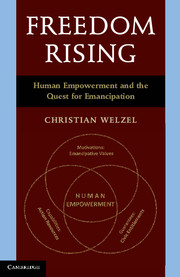Book contents
- Frontmatter
- Dedication
- Contents
- List of Tables
- List of Figures
- List of Boxes
- Abbreviations
- Preface
- Acknowledgment
- Introduction
- Part A Understanding Emancipative Values
- Part B Emancipative Values as a Civic Force
- Part C Democratic Impulses of Emancipative Values
- Part D Emancipative Values in Human Civilization
- 11 The Redirection of Civilization*
- 12 The Sustainability Challenge
- Conclusion
- References
- Index
11 - The Redirection of Civilization*
Published online by Cambridge University Press: 05 June 2014
- Frontmatter
- Dedication
- Contents
- List of Tables
- List of Figures
- List of Boxes
- Abbreviations
- Preface
- Acknowledgment
- Introduction
- Part A Understanding Emancipative Values
- Part B Emancipative Values as a Civic Force
- Part C Democratic Impulses of Emancipative Values
- Part D Emancipative Values in Human Civilization
- 11 The Redirection of Civilization*
- 12 The Sustainability Challenge
- Conclusion
- References
- Index
Summary
Cultures do not exist as simply static “differences” to be celebrated but compete with one another as better and worse ways of getting things done.
– T. Sowell 1996: 378The theory of emancipation derives its description of human empowerment from a single evolutionary principle: the utility ladder of freedoms. Accordingly, human empowerment is a development that elevates societies on the utility ladder of freedoms. Two theses of the theory address separate aspects of causality in this ascension. The sequence thesis [italic letters] addresses the endogenous causation of human empowerment, that is, the dominant flow of impact among its three elements: action resources, emancipative values and civic entitlements. Specifically, the sequence thesis suggests that, as expanding action resources increase the objective utility of freedoms, growth in freedoms’ subjective valuation and in their legal guarantees follow subsequently, giving rise to emancipative value and to civic entitlements. Chapters 4, 8 and 9 provided conclusive evidence in support of this sequence.
In contrast to the sequence thesis, the source thesis [italic letters] addresses the exogenous causes of human empowerment. Exogenous causality refers to the original source of human empowerment, which cannot itself be an element of the process. Since we have not yet dealt thoroughly with the exogenous causes of human empowerment, this chapter examines the source thesis. The source thesis posits that human empowerment originates in a particular environmental condition. This condition harbors two natural forms of existential security and existential autonomy, both of which bestow on freedoms an initial utility that is otherwise lacking. I identify this environmental condition in what I call the cool-water condition (CW condition).
- Type
- Chapter
- Information
- Freedom RisingHuman Empowerment and the Quest for Emancipation, pp. 335 - 375Publisher: Cambridge University PressPrint publication year: 2013



